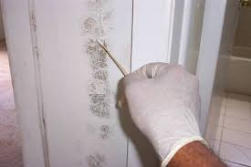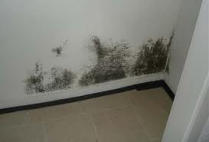


"If you are going to do a job, do it
well, so you are proud to put your
name on it"... George E. Wilson

A. Wilson Home Inspection
Knowledge - Trust - Integrity
Certified Professional Mold Inspector in Athens, GA…. Proudly Serving all of North Georgia
A. Wilson Home Inspection . 678-726-7271
{Copyright (C) 2012 A. Wilson Home Inspection All Rights Reserved}

Mold Assessment - Inspection


What is Mold?
Mold is a type of fungus that grows in our natural environment when
exposed to excess water or moisture. Mold spores--tiny microscopic
seeds--can be found virtually everywhere, including in homes. They waft
through the indoor and outdoor air continually and can grow on building
materials and furnishings. When mold spores land on a spot which high
enough moisture levels, the mold spores may begin growing and
digesting. When excessive moisture or water accumulates in or on a
building, mold growth will often occur, particularly if the moisture
problem remains undiscovered or un-addressed. The key to preventing
mold growth is to control moisture intrusion.



Can Mold Cause Health Problems? Molds are usually not a problem indoors, unless mold spores land on a wet or damp
spot and begin growing. Molds have the potential to cause health problems. Molds produce allergens (substances that can cause
allergic reactions), irritants, and in some cases, potentially toxic substances (mycotoxins). Inhaling or touching mold or mold
spores may cause allergic reactions in sensitive individuals. Allergic responses include hay fever-type symptoms, such as
sneezing, runny nose, red eyes, and skin rash (dermatitis). Allergic reactions to mold are common. They can be immediate or
delayed. Molds can also cause asthma attacks in people with asthma who are allergic to mold. In addition, mold exposure can
irritate the eyes, skin, nose, throat, and lungs of both mold-allergic and non-allergic people. Symptoms other than the allergic
and irritant types are not commonly reported as a result of inhaling mold. Research on mold and health effects is ongoing.
How do I get rid of mold?
It is impossible to get rid of all mold and mold spores indoors; some mold spores
will be found floating through the air and in house dust. The mold spores will not
grow if moisture is not present. Indoor mold growth can and should be
prevented or controlled by controlling moisture indoors. If there is mold growth
in your home, you must clean up the mold and fix the water problem. If you
clean up the mold, but don't fix the water problem, then, most likely, the mold
problem will come back.
Click here to schedule your A.Wilson Inspection … Schedule Inspection


A. Wilson Home Inspection . 678-726-7271
{Copyright (C) 2012 A. Wilson Home Inspection All Rights Reserved}

Mold Assessment - Inspection


What is Mold?
Mold is a type of fungus that grows in our natural environment
when exposed to excess water or moisture. Mold spores--tiny
microscopic seeds--can be found virtually everywhere, including
in homes. They waft through the indoor and outdoor air
continually and can grow on building materials and furnishings.
When mold spores land on a spot which high enough moisture
levels, the mold spores may begin growing and digesting. When
excessive moisture or water accumulates in or on a building,
mold growth will often occur, particularly if the moisture
problem remains undiscovered or un-addressed. The key to
preventing mold growth is to control moisture intrusion.

Can Mold Cause Health Problems? Molds are usually not a
problem indoors, unless mold spores land on a wet or damp spot
and begin growing. Molds have the potential to cause health
problems. Molds produce allergens (substances that can cause
allergic reactions), irritants, and in some cases, potentially toxic
substances (mycotoxins). Inhaling or touching mold or mold spores
may cause allergic reactions in sensitive individuals. Allergic
responses include hay fever-type symptoms, such as sneezing,
runny nose, red eyes, and skin rash (dermatitis). Allergic reactions
to mold are common. They can be immediate or delayed. Molds can
also cause asthma attacks in people with asthma who are allergic to
mold. In addition, mold exposure can irritate the eyes, skin, nose,
throat, and lungs of both mold-allergic and non-allergic people.
Symptoms other than the allergic and irritant types are not
commonly reported as a result of inhaling mold. Research on mold
and health effects is ongoing.
A. Wilson Home Inspection
Knowledge - Trust - Integrity
"If you are going to do a job, do
it well, so you are proud to put
your name on it"...
George E. Wilson

Click here to schedule your A.Wilson Inspection …
Schedule Inspection
Certified Professional Mold Inspector in Athens, GA…. Proudly Serving
all of North Georgia





























